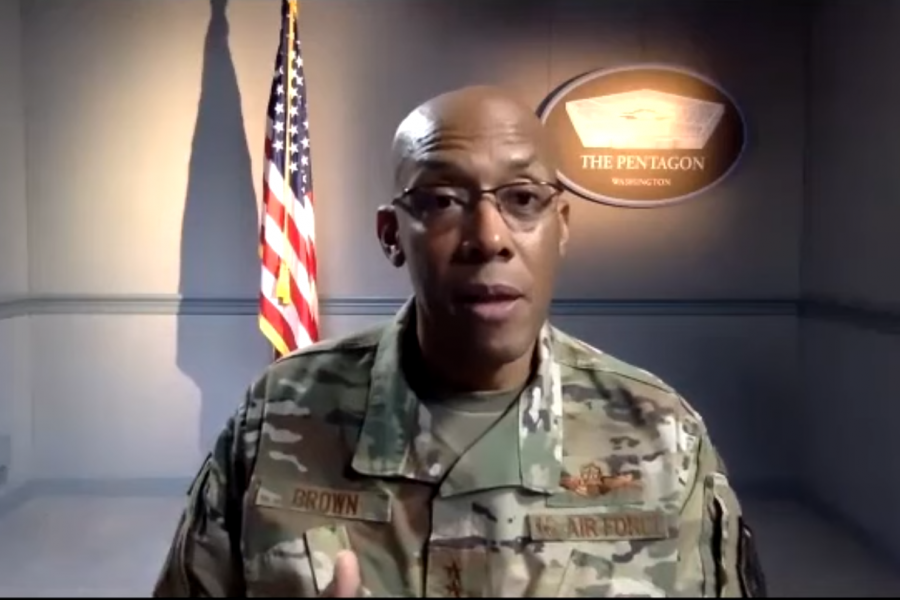A meeting among the Air Force’s top leaders earlier this month, billed as the venue where tough decisions for the fiscal 2022 budget would be made, saw intense debate requiring further discussion, Chief of Staff Gen. Charles Q. Brown Jr. said Oct. 21.
In an AFA Mitchell Institute virtual event, Brown said he expected to be asked, “What did you decide?” after the Corona meeting. But, “this is a process,” and he is now following up with “more engagement” with combatant commanders and major command chiefs, as well as the Air Staff. Circumstances change “every day,” he said, and the Corona meeting wound up being “the first steps on this journey, as we keep knocking … down” action items.
The current draft of the service’s 2022 budget request doesn’t allow for each MAJCOM to get its “No. 1” request, Brown said. “We’ve got to look at the entire Air Force.” Some MAJCOMS have already been told, “You’re going to get less, or your No. 1 is not going to get as much as you’d like.” He did not specify any of the systems or capabilities the service may have to give up to afford new investments.
Air Force leaders at AFA’s virtual Air, Space & Cyber conference in September deferred discussions on the service’s budget priorities, saying the major decisions would be hashed out at Corona. Broadly, Brown said, the budget discussions were of a “design implementation” character.
Brown wants his commanders to take more of an enterprise approach to budget requests and expectations, and to “see the future a bit better.” Although he acknowledged that, “No one likes to lose anything. The first response will be ‘no;’ that’s why they teach ‘sharing’ in kindergarten,” he said. But COCOMs need to understand they have to balance the demands of now with the future.
It remains to be decided which “silos of excellence” are most important, and “where we take risk.” Commanders have to “talk to each other, at least in front of me,” so they aren’t working toward conflicting unfunded mandates where they are fighting “among themselves because ‘the Chief said.’ I want to get them all in one room, as much as I can, to have these deeper discussions, so we can make choices” together, Brown said.
Brown’s frustrated with the Air Force culture of decision-making “from the bottom up,” saying, “It’s amazing, at this level, how many things come to you, and it’s already been decided … I’m not even sure why I’m signing off on the piece of paper, because they’ve already come up with the answer. But is it the right answer?”
This “culture of consensus” slows the service down, he said, because “you can’t get everybody to agree, so you don’t agree, and you keep working it until you beat down your dissenters,” at which point it’s put before a boss “to approve it.”
Brown said he insists there has to be a dialog and high-level debate.
“Sometimes I want to hear what the other side has to say,” he said, repeating his frequent observation of Air Force staffs having a “meeting after the meeting,” in which dissenters hold their objections until they’re “out in the hallway,” after decisions are made. Brown said he wants dissenters to speak up, because “the train is leaving the station,” and decisions may be made without all the necessary inputs.
“What I’m trying to do is drive these conversations, deeper dives, earlier in the process, where I’m included in the conversations, so … I don’t get it at the very end [where] I have very little wiggle room.”
He cautioned, though, that he doesn’t want dissent for its own sake. While some objections to plans may be based on “judgement, … and I get that,” there also has to be “some data to back it up.”
Brown likes “read ahead” reports, but he doesn’t want PowerPoint briefings, because “I’ve already read that. Let’s have a conversation. And that’s helpful, because I can actually get more information from them. We get a better product because of the dialog.” At least, he said, “We’ll learn where the friction points are.”
One of the main topics of discussion at the Corona meeting was how the Air Force will “look in the mirror” and change its bureaucracy to move more swiftly, Brown reported. He wants to know what USAF is doing “that slow[s] down our decision making,” and whether cross-domain engagements are happening early enough in the process to enable meaningful conversations about future decisions.
Brown also wants to engage external stakeholders—Congress, other services, industry, etc.—earlier in the decision-making process. “To say, … this is where we’re going as an Air Force, so we’re not fighting among ourselves or competing among ourselves for dollars and capability all the way to the endgame.”
More discussion and engagement will “cut down on the friction,” Brown asserted, and USAF will be able to “move a little bit faster.”
